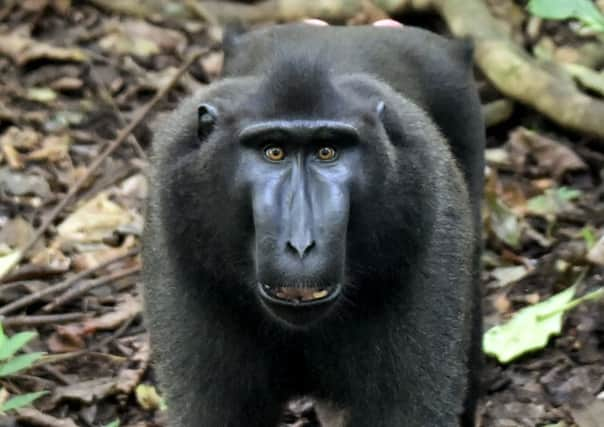Martyn McLaughlin: Copyright question is more than just monkey business


It would not come as a surprise if Naruto, the crested black macaque, is smiling this week. Thanks to a defining image taken six years ago, which spread across the internet faster than a meme of a kitten dancing to Rick Astley, he is already one of the most famous monkeys in the world. Now, his renown has been rewarded with a modest windfall that ensures he will live out his remaining days in relative comfort.
On Monday, a settlement was reached between David Slater, a British wildlife photographer, and the animal rights advocacy group, People for the Ethical Treatment of Animals (Peta), bringing to an end a long, drawn out, and apparently absurd legal dispute.
Advertisement
Hide AdAdvertisement
Hide AdIt centred around a famous photograph of the animal taken six years ago while Mr Slater, from Gloucestershire, was on a photoshoot deep in the forests of Indonesia. One day, he set up his tripod and left it unattended. On his return, he discovered one of the monkeys he had been following had grabbed his camera and taken a picture.
The result was a thing of wonder, a naked self-portrait of the macaque, taken at an artful tilt, which seemed to reveal its true character. Grinning widely and blissfully indifferent to the opinions of those with exacting dental standards, he projected pride and, perhaps, a dash of self-consciousness.
That, at least, was the contention put forward by Peta, which ruled it was Naruto, and not Mr Slater, who should own copyright of the image. In line with all pioneering challenges to the status quo – the engine for change and progress in any legal system – the organisation argued that the issue of who owned the camera was inconsequential. The real question was whether animals could assert the right to be viewed as the ‘author’ of a creative work.
Peta, unsurprisingly, claimed they could. If successful, they pointed out a legal precedent would be set which declared Naruto as the owner of property, instead of being a piece of property himself.
Sadly, the decision to go to settlement – the terms of which will see Mr Slater donate 25 per cent of future royalties to animal charities dedicated to protecting the monkeys’ natural habitat – means we will never know what the three judge panel at the 9th US Circuit Court of Appeals might have said.
It looks like the settlement was a savvy PR move by Mr Slater rather than an admission of possible defeat. The chances of Peta succeeding were slim at best. Last year, a federal district judge in San Francisco ruled that Naruto lacked standing to sue, a decision which prompted the latest appeal.
It is not the first time Peta has been accused of pursuing a vexatious legal claim which attracted much in the way of publicity without any real prospect of success in the courts. In 2011, it filed a lawsuit against the San Diego visitor attraction, Sea World, listing five orcas as the plaintiffs.
The whales, Peta argued, had been forcibly taken from their natural habitat, and it claimed Sea World was guilty of violating the thirteenth amendment of the US constitution, which abolished slavery. The case was thrown out by a district judge, who said the only reasonable interpretation of the amendment’s language was that it “applies to persons, and not to non-persons.”
Advertisement
Hide AdAdvertisement
Hide AdHad the Naruto case, built on just as flimsy a pretext, been allowed to proceed, it seems inconceivable that the ruling would have been any different. The notion of ‘monkey see, monkey sue’ is a rather brittle legal argument, and it is impossible to determine whether a macaque - or any animal, for that matter - is capable of understanding that it is creating a piece of ‘work’.
Both cases are fundamentally flawed for the simple reason that granting rights to someone – or something – implies that the holder has the agency to invoke them. In Naruto’s case, how would he be able to make use of his copyright by licensing others to use his image? Would that famous grin turn into a grimace as he carried out a Google image search and realised his intellectual property was being exploited by stallholders selling unofficial Naruto T-shirts in the Barras?
In a legal system which has been kept busy contesting the worst excesses of President Donald Trump, the lawsuit has provided levity, but we should not be so quick as to dismiss it as comic relief.
At a time when poachers are intent on reducing the status of endangered species to that of a rumour, Petas’ reckless crusade through the courts risked trivialising the law and the important question of man’s moral obligation to animals.
Yet it is only a matter of time before the issue of who – or what – can claim ownership over a piece of work is debated more keenly. The next time, it will not be a question of species, but technology.
The proliferation of deep learning computer algorithms, which are increasingly capable of operating and improving without human supervision, is opening up a new and uncharted legal frontier. At its heart is the conundrum of whether a machine or a piece of software devised by man can claim authorship of their creations.
These systems are already capable of producing prose, poetry, and paintings. Much of it is terrible guff, but the odd work – such as the Next Rembrandt initiative, which uses machine-learning algorithms to create ‘new’ works by the Dutch master – is startling.
Peta’s case may be monkey business, but the curious, throwaway case of Naruto the self-mythologising macaque could be more serious than you might think.